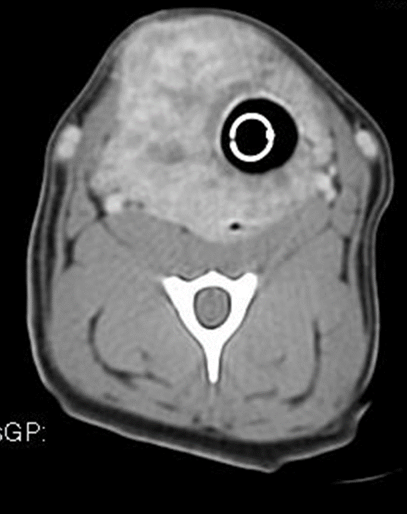Treatment options for dogs with unresectable thyroid cancer
Did you know that 25-50% of dogs with thyroid cancer are unresectable?
Thyroid cancer represents 1.1% of all canine tumours with thyroid carcinoma representing 90% of thyroid cancer in dogs.
The treatment of choice is surgery, which is associated with median (average) survival times of 3-4 years in dogs with nonmetastatic thyroid carcinomas. However, due to the locally invasive nature of these tumours into the surrounding structures (such as the trachea, larynx, carotid artery and jugular vein), sometimes these tumours are not amenable to surgery. Unresectable thyroid carcinomas have a median survival time of 3-4 months.
What are the other treatment options?
Radiation therapy, radioactive iodine, chemotherapy and Palladia® (toceranib phosphate) are options that can be considered for dogs with unresectable thyroid carcinomas.
Radiation therapy
Radiation therapy consists of either conventional finely fractionated radiation therapy, palliative conventional radiation therapy and stereotactic radiation therapy (SRT), which are administered to dogs under general anaesthesia.
Conventional finely fractionated radiation therapy is typically administered daily, Monday to Friday for around 3.5 weeks. The median survival time reported with this approach is 2-4 years with the maximum response seen around 8-22 months after finishing radiation therapy.
Palliative conventional radiation therapy is typically administered weekly for four treatments. The median survival time reported with this approach is around six months to 2.4 years.
Stereotactic radiation therapy is a relatively new form of radiation therapy in veterinary medicine and typically involves three consecutive daily high doses of radiation therapy. In one recent study of 23 dogs with predominately advanced stage thyroid carcinoma, the overall response rate was 70%, with 81% of dogs experiencing clinical improvement at a median time of two weeks after starting SRT. The overall median survival time was around one year and for dogs with or without metastasis. SRT provides the benefit of a reduced number of general anaesthesias and shorter treatment duration. However, it is expensive.
Radioactive iodine
Radioactive iodine (I131) is a subcutaneously administered radioactive isotope that concentrates in areas of active thyroid tissue (i.e. thyroid cancer). It works by selectively destroying active thyroid tissue within a 2-mm radius where it concentrates. Normal tissues are preserved because it does not actively uptake I131. In humans, the treatment of choice for thyroid tumours is surgery followed by radioactive iodine. In dogs, I131 can be used to treat thyroid carcinoma not amenable to surgery and in dogs with metastasis. The median survival time with I131 treatment in dogs with stage IV (i.e. metastatic) thyroid carcinoma is around one year. Most thyroid tumours and their metastasis retain the ability to trap I131. However, some thyroid carcinomas are not able to uptake I131 and thus, will not respond to treatment with I131. In order to determine eligibility, dogs will require a technetium-99-m (99mTc) scan and isolation for around 24 hours afterwards.
Chemotherapy
Cisplatin-based chemotherapy protocols are used in humans for the treatment of advanced thyroid tumours. In one study of 13 dogs with macroscopic thyroid carcinoma, the response rate to cisplatin was 54% for a median duration of seven months. However, in dogs that are otherwise healthy, carboplatin is my preferred treatment, because it is associated with much less adverse effects, treatment delays, dose reduction and hospitalisation. Doxorubicin has a response rate of 30-40% with a median survival time of 7.5 to 8.5 months. The median survival time for dogs with stage IV thyroid carcinoma was four months. Occasionally, dogs treated with chemotherapy can go into complete remission. A good aim with chemotherapy is a survival time of around 6-8 months.
Palladia®
Palladia® is an oral tyrosine kinase inhibitor that has reported efficacy for dogs with macroscopic thyroid carcinoma. Moreover, tyrosine kinase inhibitors are used for the treatment of advanced thyroid carcinomas in humans.
The overall response rate to Palladia® in dogs with macroscopic thyroid carcinoma is around 25-46%, with an additional 42-53% of dogs experiencing stable disease. The median duration of response is around seven months to 2.8 years, and the median survival time is around 1.5 to 3 years.
Vets, I hope this information helps you understand a bit more about the treatment options for dogs with unresectable thyroid carcinomas. If you have a question about canine thyroid carcinomas or a case that you would like evaluated, please do not hesitate to get in touch by clicking here.

